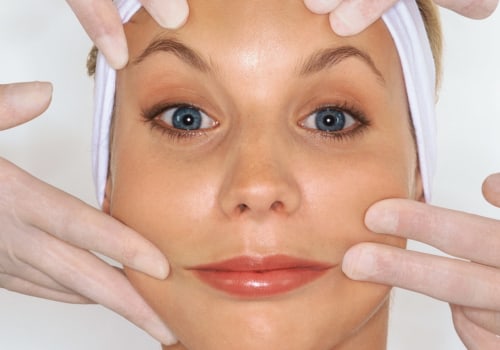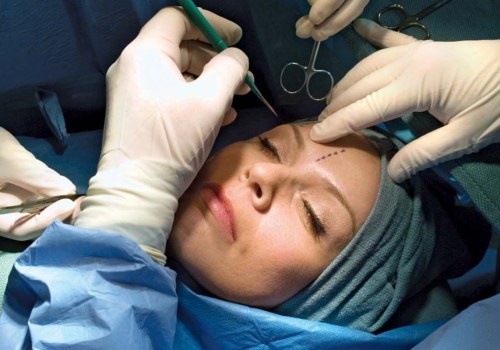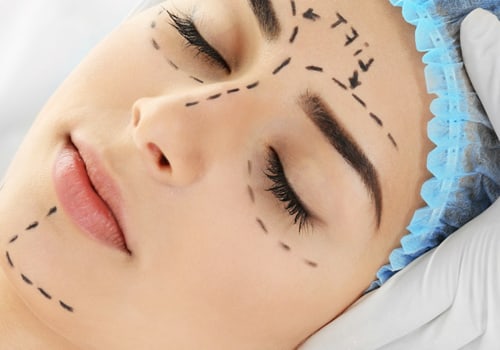RisksComplications related to anesthesia, such as pneumonia, blood clots and, in rare cases, death, Infection at the incision site, which may worsen scarring and require additional surgery, Buildup of fluid under the skin. Be wary of plastic surgery offers that are too good to be true. Some people travel outside the country to have plastic surgery at cheaper prices. However, this may increase some of the risk.
Taking a long flight soon after surgery may increase your risk of blood clots. Hematoma is a risk in almost all surgeries. Treatment sometimes includes additional operations to drain the blood if the accumulation of blood is large or is growing rapidly. This may require another procedure in the operating room and sometimes additional anesthesia.
As with any surgery, some blood loss is expected. However, uncontrolled blood loss can lead to a decrease in blood pressure with life-threatening results. Blood loss can occur while on the operating table, but also internally, after surgery. Although postoperative care includes measures to reduce the risk of infection, it is still one of the most common complications of plastic surgery.
For example, infections occur in 1.1 to 2.5 percent of people who undergo breast augmentation. Cellulitis from skin infection can occur after surgery. In some cases, infections can be internal and severe, and require intravenous (IV) antibiotics. The potential for nerve damage is present in many different types of surgical procedures.
Numbness and tingling are common after plastic surgery and may be signs of nerve damage. In most cases, nerve damage is temporary, but in some cases it may be permanent. Most women experience a change in sensitivity after breast augmentation surgery, and 15 percent experience permanent changes in nipple sensation. Hypertrophic scarring, for example, is an abnormally red and thick raised scar.
Along with smooth and hard keloid scars, it occurs in 1.0 to 3.7 percent of tummy tucks. General anesthesia can sometimes lead to complications. These include lung infections, strokes, heart attacks, and death. Knowledge of anesthesia, or waking up in the middle of surgery, is very rare, but also possible.
Cosmetic surgery, like any type of surgery, is not without risks. Plastic surgery procedures can lead to complications ranging from an unattractive or unnatural end result to scarring or even death. The best way to reduce the risk of a bad outcome is to choose a board-certified surgeon who performs the procedure frequently. This gives a false erroneous impression that most cosmetic procedures are safe, with few or fewer complications.
Many people mistakenly assume that elective (optional) procedures, such as cosmetic surgery, are not as serious as other types of surgery. Cosmetic Procedures Up 4% for 30-Year-Old Women, and 30% of All Liposuction Recipients Are 19-34 Years Old, American Society for Aesthetic Plastic Surgery Reports. Although that risk may be less than 1%, death may occur during the most minor surgery. Equally important is finding a reputable surgeon with board certification in cosmetic surgery and experience in the specific surgery you want to undergo.
Highlighting and analyzing adverse events in published literature will definitely help make cosmetic procedures less risky, help introduce newer and safer techniques, and force doctors and industry to introduce game-changing, risk-free trends for the future. While it is true that non-invasive procedures are still popular, the fact is that cosmetic surgeries such as liposuction and facelifts are more popular than ever. Nowadays, the most common cosmetic surgeries are liposuction, breast enhancement, eyelid surgery, tummy tuck and nose work. Because cosmetic surgeries are operations that people choose to look or feel better, if their expectations aren't realistic, they may be disappointed with the results.
The main risk you run when undergoing a plastic surgery procedure is the medical complications that may arise later. If a perceived physical defect plays a role in any type of depression, anxiety, or stress you may be dealing with, cosmetic surgery may be something to consider. Cosmetic surgery works best if you are healthy, have a positive outlook, and have realistic expectations about what the procedure can do for you. During the consultation process for cosmetic surgery, the surgeon will ask you about your medical history.
Patients may never be fully prepared for the mental and emotional costs of cosmetic surgery, says Joseph Hullett, psychiatrist and senior medical director of OptumHealth. . .







